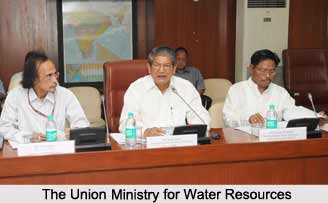 Ministry of Water Resources is responsible for looking to the maintenance of the water supply in the country and its efficient monitoring. Prior to independence it was the department of industries and labour, inter-alia, which was looking after the subjects of `Irrigation & Power`. A Central Board of Irrigation and Power was created in 1927. With the bifurcation of Department of Industries and Labour in 1937 into the Department of Communication and Department of Labour, the latter was assigned the work relating to `Irrigation and Power`. Following this, there were a number of organisations and re organisations of the ministry. Finally in 1985, the then Ministry of Irrigation and Power was bifurcated and the Department of Irrigation was re-constituted as the Ministry of Water Resources. This recognition of the necessity of planning for the development of the country`s water resources in a coordinated manner resulted in a change in the character of the Ministry and the Ministry has been assigned a nodal role in regard to all matters concerning the country`s water resources.
Ministry of Water Resources is responsible for looking to the maintenance of the water supply in the country and its efficient monitoring. Prior to independence it was the department of industries and labour, inter-alia, which was looking after the subjects of `Irrigation & Power`. A Central Board of Irrigation and Power was created in 1927. With the bifurcation of Department of Industries and Labour in 1937 into the Department of Communication and Department of Labour, the latter was assigned the work relating to `Irrigation and Power`. Following this, there were a number of organisations and re organisations of the ministry. Finally in 1985, the then Ministry of Irrigation and Power was bifurcated and the Department of Irrigation was re-constituted as the Ministry of Water Resources. This recognition of the necessity of planning for the development of the country`s water resources in a coordinated manner resulted in a change in the character of the Ministry and the Ministry has been assigned a nodal role in regard to all matters concerning the country`s water resources.
With the re-designation of the Ministry of the Water Resources, purposive steps were taken to fulfil the role expected of the Ministry with this new perspective calling for overall planning and coordination of all aspects of the development of the country`s water resources. The imperative need was to formulate a water policy laying down, inter-alia, priorities for the various uses of water. Therefore, a National Water Resources Council was constituted under the Chairmanship of Prime Minister to look into this aspect. This Council adopted the National Water Policy in September, 1987.
Functions of Ministry of Water Resources
The Ministry of Water Resources is responsible for laying down policy guidelines and programmes for the development and regulation of country`s water resources. The Ministry has been allocated the following functions- Overall planning, policy formulation, coordination and guidance in the water resources sector; Technical guidance, scrutiny, clearance and monitoring of the irrigation, flood control and multi-purpose projects (major/medium); General infrastructural, technical and research support for sect oral development; Providing special Central financial assistance for specific projects and assistance in obtaining external finance from World Bank and other agencies; Overall policy formulation, planning and guidance in respect of minor irrigation and command area development, administration and monitoring of the Centrally Sponsored Schemes and promotion of participatory irrigation management; Overall planning for the development of ground water resources, establishment of utilizable resources and formulation of policies of exploitation, overseeing of and support to State level activities in ground water development; Formulation of national water development perspective and the determination of the water balance of different basins/sub-basins for consideration of possibilities of inter-basin transfers; Coordination, mediation and facilitation in regard to the resolution of differences or disputes relating to inter-state rivers and in some instances, the overseeing of the implementation of inter-state projects; Operation of the central network for flood forecasting and warning on inter-state rivers, the provision of central assistance for some State Schemes in special cases and preparation of flood control master plans for the Ganga River and the Brahmaputra River; Talks and negotiations with neighbouring countries, in regard to river waters, water resources development projects and the operation of the Indus Water Treaty.






